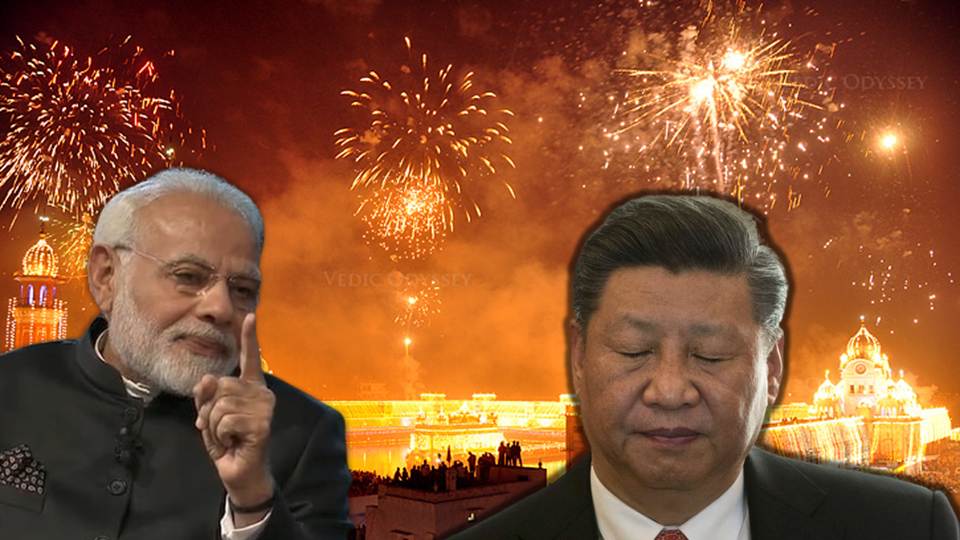Xi Jinping’s Galwan misadventure has given Indians one more reason to celebrate their festivals. Earlier, Indians only used to rejoice in the traditions, cultures, and glory that festivals brought. After May 2020, financial loss of China during Diwali and other festivals became an additional catalyst for us.
China suffers a severe loss in Diwali sales
This year, Indians not only led a civil disobedience against the “no-crackers” cartel but also jolted one of their main funding sources in a big way. According to estimates by the Confederation of All India Traders (CAIT), a non-governmental trade association and advocacy group which represents more than 7 crore Indian businesses, Chinese businesses suffered losses worth over Rs 75,000 crore this year. Total Diwali sales are expected to cross Rs 1.50 lakh crore this year.
In a statement, CAIT National President BC Bhartia and Secretary General Praveen Khandelwal said, “CAIT estimates that this year’s Diwali festival sales figure will cross Rs 1.50 lakh crores in the country. The other bright face of the festivity relates to the priority of consumers to purchase only Indian goods which have caused a business loss of Rs 75,000 crores to China,”
Diwali’s bumper sales were led by earthen lamps, deities, wall hangings, handicraft items, traditional good luck charms, consumer goods like toys, electronics, power tools and accessories, kitchen items and other appliances, confectionery, snacks, home furnishing, textiles. CAIT thrusts that the Indians choosing local manufacturers for buying these stuff is directly attributable to PM Modi’s initiatives such as vocal for local and Aatmanirbhar Bharat campaign.
Dhanteras sales were a prelude to Diwali
Diwali sales put an end to rumours of a global slowdown halting India’s consumption capacity. The trends were clear during the pre-Diwali Dhanteras sales itself. During two days (October 22 and 23), the festival of Dhanteras, revenues worth Rs 45,000 crore were generated. Around 45 per cent of these businesses were generated in segments such as automobiles, computers and computer-related goods, furniture, items needed for home and office decoration, sweets and snacks, kitchen items, utensils, electronics, and mobile items.
Unsurprisingly, the rest of Rs 25,000 crores worth of business was generated in the jewellery segment. Sales of jewellery during Dhanteras are in line with the larger trend observed during the July-September period. During the 90-day period, India’s gold demand grew by 80 percent in Year-on-Year (YoY) terms. The icing on the cake is that, despite an increase in gold demand, our gold imports have declined by 11.72 per cent in 2022.
Also read: India smashes China with Diwali sales in two big ways
Aatmanirbharta in full flow
The numbers clearly indicate that Indians are getting prosperous on the back of their own. Apparently, when PM Modi decided to launch his initiatives towards securing India’s economic interests in its own geography, even he would not have thought that such a level of self-sufficiency would be achieved in a few years. The Modi Cabinet just wanted India to have enough firepower in its belly to push for India’s interests in bilateral and multilateral trade deals.
That is how the Aatmanirbhar campaign kicked off. However, India did not say that it wouldn’t trade with other countries. In fact, while we were building a base for ourselves, Chinese products kept flooding the Indian markets. The Modi government did not object to it since it was the need of the hour. On the back of increased trade, India-China relations also seemed to take leaps and bounds.
Also read: India’s Aatmanirbhar Diwali set to burn a gigantic hole in China’s pocket
China paying for its sins
But then China decided to backstab us in the Galwan valley. It was thought that the Indians would back down, but India did not. We held on to our position on borders and started an economic boycott of China. As a result, Chinese companies started to suffer jolts after jolts. During the 2020 Diwali, it suffered a loss worth over Rs 40,000 crore. Next year, its loss was worth Rs 50,000 crore. The trends keep repeating in other festivals as well. This year’s loss further exacerbated this number.
It is not that trade with China has come to a standstill. Situations on the borders are also better. However, the Indian population now understands that it is just a mini blip and, in the long run, China is not trustable.
Support TFI:
Support us to strengthen the ‘Right’ ideology of cultural nationalism by purchasing the best quality garments from TFI-STORE.COM
